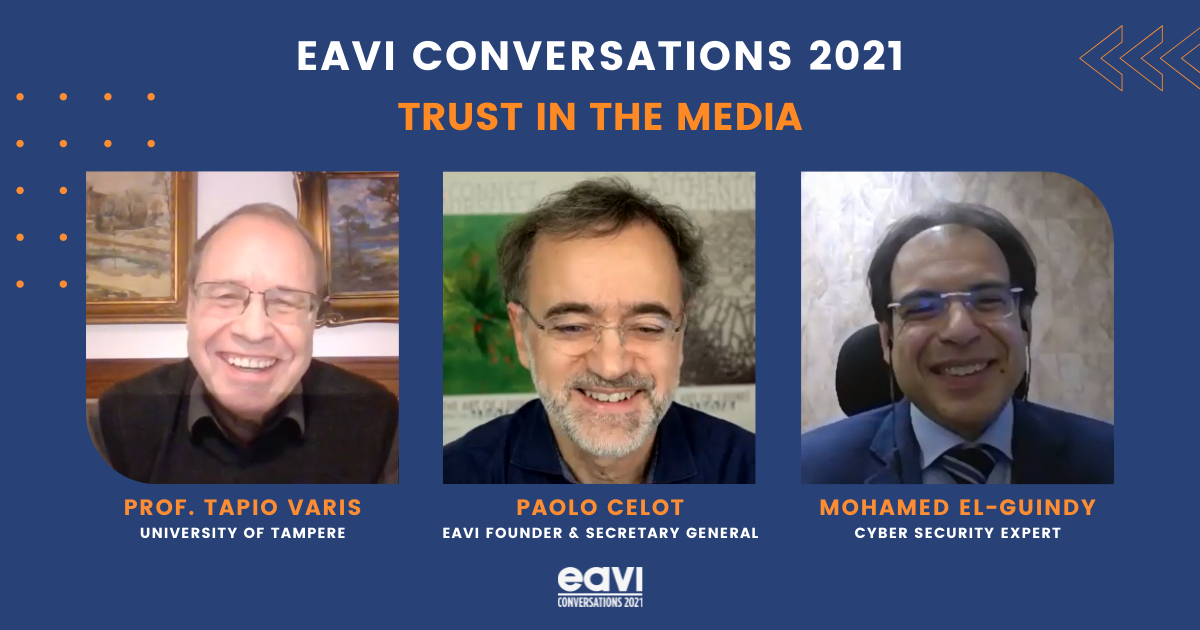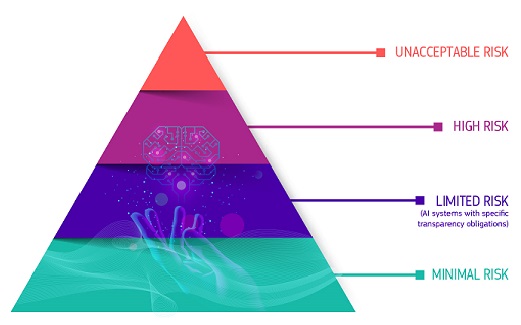Conclusions drawn from the discussion with Prof. Tapio Varis and Dr. Mohamed El-Guindy – 23rd of November (EAVI Conversations 2021)

Trust is a really complicated word to be defined, especially when it comes to media, as it encompasses psychological, political and emotional factors. Moreover, as different studies and research show, trust in the media may vary not only according to the demographics but also to the geographical area. We explored this matter in one of our sessions with Prof. Tapio Varis and Dr Mohamed El-Guindy, experts respectively in Europe and the Middle East.
The media are one of the main institutions under suspicion lately (especially following the COVID-19 infodemic) and seem unable to reinstate their credibility. The question our two guests tried to answer is: how can we build trust in media again?
The main reason for mistrust is the shift of paradigm from us looking for news to the other way around: news looking for us. Nowadays, there is an overload of information causing disorientation in the readers. The psychological impact of the new media, especially social media, stems from the fact that it is difficult to understand and analyse how they function. In contrast, with traditional media such as TV, mass media and radio, it is easier to detect bias and biased channels. This is mainly due to the complicated AI algorithms which control our usage; we should not forget that we are a target for special psychological warfare!
Going back to the different perceptions of trust in media, let’s now focus on the differences existing between the two geographical areas under our evaluation: Europe and the Middle East. According to Reuters, the country where people trust the media and news the most in Finland, with a trust rate of 64%, as recently as 2021, compared to 29% in the United States for instance. Freedom of the press plays a crucial role when it comes to trust. In the Scandinavian countries, there has always been a strong tradition of no-censorship and freedom of the press. This does not necessarily mean that the press is better, but the emphasis on press independence inspires more confidence in young generations. The high level of education and freedom led to a higher number of desirable and positive outcomes. In the United States instead, where there has been a media war for 20 years, with media outlets attacking each other, there is a low score in terms of the trust. In the European Union, too, five countries (Bulgaria, Hungary, Poland, Malta, Greece), are criticized for the deterioration of freedom.
According to Dr El-Guindy, the situation in the Middle East is extremely different, as young people do not trust at all traditional media and rely exclusively on social media. As a large part of the population is young and really active and present online, their only source of information are social networks. Additionally, mainstream media, due to the decrease in their audience indexes, have started following the trends and imitating social media. Basically, instead of focusing on quality journalism, they tackle only the topics people would like to hear about. Moreover, media freedom in the Middle East has evolved continuously, resulting in a deterioration mainly due to historical events. After the happenings of the Arab Spring, several governments restricted the information published in different media channels due to the increasing threats. Egypt is currently trying to take the distances from this trend and thanks to the Human Rights Strategy, the government is open to restarting conversations and debate around the right to information.
Journalists’ role is becoming more and more crucial, given the current status of our media environment. It is not a coincidence that the Norwegian Nobel Peace Prize Committee awarded two journalists this year. This happened only once before in history, in 1935. In times of crisis like those, we are currently experiencing, only free, independent and fact-based journalism is able to protect us from the abuse of power, lies and propaganda.
Another reason for disorientation and discrepancies in media is the language barrier. Prof. Tapio Varis is concerned about the possibility of accessing knowledge, as currently, English is such a predominant language in the field that results in biased communication, especially when it comes to something happening abroad (like the Arab Spring for instance). The views and the opinions accounted for are one-sided. In the Middle East, there are not enough trustful resources in all the languages spoken in the region. Since the English language together with the American media is predominant, we tend to take the agenda and the ideas propagated for granted. Therefore, there is a need for multiple sources in different languages, also considering people’s relationships and attitudes towards information and the media.
Despite the demonization of social media, we need to be realistic in the attempt to rebuild trust. People would like to know the truth, regardless of the media channel they use. We should not blame exclusively social media, as these platforms are just part of the game and their goal is to make a profit. They are built to get our attention, they want to appeal to us, it is their business model. That’s why it’s important for the government to try to be present on these channels to counteract disinformation phenomena and to educate people, spread the truth and build trust.
Ultimately, we need to educate people about the media, on how to use them and how to find reliable information; and finally, how to deal with professional or non-professional journalism. And this is where the importance of media literacy lies for the development of a society in which people can learn from and live with the media, and finally exploit social media for good.
Are you interested in watching the different sessions of the EAVI Conversations 2021?
Conclusions drawn from the discussion with Prof. Tapio Varis and Dr. Mohamed El-Guindy – 23rd of November (EAVI Conversations 2021)

Trust is a really complicated word to be defined, especially when it comes to media, as it encompasses psychological, political and emotional factors. Moreover, as different studies and research show, trust in the media may vary not only according to the demographics but also to the geographical area. We explored this matter in one of our sessions with Prof. Tapio Varis and Dr Mohamed El-Guindy, experts respectively in Europe and the Middle East.
The media are one of the main institutions under suspicion lately (especially following the COVID-19 infodemic) and seem unable to reinstate their credibility. The question our two guests tried to answer is: how can we build trust in media again?
The main reason for mistrust is the shift of paradigm from us looking for news to the other way around: news looking for us. Nowadays, there is an overload of information causing disorientation in the readers. The psychological impact of the new media, especially social media, stems from the fact that it is difficult to understand and analyse how they function. In contrast, with traditional media such as TV, mass media and radio, it is easier to detect bias and biased channels. This is mainly due to the complicated AI algorithms which control our usage; we should not forget that we are a target for special psychological warfare!
Going back to the different perceptions of trust in media, let’s now focus on the differences existing between the two geographical areas under our evaluation: Europe and the Middle East. According to Reuters, the country where people trust the media and news the most in Finland, with a trust rate of 64%, as recently as 2021, compared to 29% in the United States for instance. Freedom of the press plays a crucial role when it comes to trust. In the Scandinavian countries, there has always been a strong tradition of no-censorship and freedom of the press. This does not necessarily mean that the press is better, but the emphasis on press independence inspires more confidence in young generations. The high level of education and freedom led to a higher number of desirable and positive outcomes. In the United States instead, where there has been a media war for 20 years, with media outlets attacking each other, there is a low score in terms of the trust. In the European Union, too, five countries (Bulgaria, Hungary, Poland, Malta, Greece), are criticized for the deterioration of freedom.
According to Dr El-Guindy, the situation in the Middle East is extremely different, as young people do not trust at all traditional media and rely exclusively on social media. As a large part of the population is young and really active and present online, their only source of information are social networks. Additionally, mainstream media, due to the decrease in their audience indexes, have started following the trends and imitating social media. Basically, instead of focusing on quality journalism, they tackle only the topics people would like to hear about. Moreover, media freedom in the Middle East has evolved continuously, resulting in a deterioration mainly due to historical events. After the happenings of the Arab Spring, several governments restricted the information published in different media channels due to the increasing threats. Egypt is currently trying to take the distances from this trend and thanks to the Human Rights Strategy, the government is open to restarting conversations and debate around the right to information.
Journalists’ role is becoming more and more crucial, given the current status of our media environment. It is not a coincidence that the Norwegian Nobel Peace Prize Committee awarded two journalists this year. This happened only once before in history, in 1935. In times of crisis like those, we are currently experiencing, only free, independent and fact-based journalism is able to protect us from the abuse of power, lies and propaganda.
Another reason for disorientation and discrepancies in media is the language barrier. Prof. Tapio Varis is concerned about the possibility of accessing knowledge, as currently, English is such a predominant language in the field that results in biased communication, especially when it comes to something happening abroad (like the Arab Spring for instance). The views and the opinions accounted for are one-sided. In the Middle East, there are not enough trustful resources in all the languages spoken in the region. Since the English language together with the American media is predominant, we tend to take the agenda and the ideas propagated for granted. Therefore, there is a need for multiple sources in different languages, also considering people’s relationships and attitudes towards information and the media.
Despite the demonization of social media, we need to be realistic in the attempt to rebuild trust. People would like to know the truth, regardless of the media channel they use. We should not blame exclusively social media, as these platforms are just part of the game and their goal is to make a profit. They are built to get our attention, they want to appeal to us, it is their business model. That’s why it’s important for the government to try to be present on these channels to counteract disinformation phenomena and to educate people, spread the truth and build trust.
Ultimately, we need to educate people about the media, on how to use them and how to find reliable information; and finally, how to deal with professional or non-professional journalism. And this is where the importance of media literacy lies for the development of a society in which people can learn from and live with the media, and finally exploit social media for good.
Are you interested in watching the different sessions of the EAVI Conversations 2021?
Conclusions drawn from the discussion with Prof. Tapio Varis and Dr. Mohamed El-Guindy – 23rd of November (EAVI Conversations 2021)

Trust is a really complicated word to be defined, especially when it comes to media, as it encompasses psychological, political and emotional factors. Moreover, as different studies and research show, trust in the media may vary not only according to the demographics but also to the geographical area. We explored this matter in one of our sessions with Prof. Tapio Varis and Dr Mohamed El-Guindy, experts respectively in Europe and the Middle East.
The media are one of the main institutions under suspicion lately (especially following the COVID-19 infodemic) and seem unable to reinstate their credibility. The question our two guests tried to answer is: how can we build trust in media again?
The main reason for mistrust is the shift of paradigm from us looking for news to the other way around: news looking for us. Nowadays, there is an overload of information causing disorientation in the readers. The psychological impact of the new media, especially social media, stems from the fact that it is difficult to understand and analyse how they function. In contrast, with traditional media such as TV, mass media and radio, it is easier to detect bias and biased channels. This is mainly due to the complicated AI algorithms which control our usage; we should not forget that we are a target for special psychological warfare!
Going back to the different perceptions of trust in media, let’s now focus on the differences existing between the two geographical areas under our evaluation: Europe and the Middle East. According to Reuters, the country where people trust the media and news the most in Finland, with a trust rate of 64%, as recently as 2021, compared to 29% in the United States for instance. Freedom of the press plays a crucial role when it comes to trust. In the Scandinavian countries, there has always been a strong tradition of no-censorship and freedom of the press. This does not necessarily mean that the press is better, but the emphasis on press independence inspires more confidence in young generations. The high level of education and freedom led to a higher number of desirable and positive outcomes. In the United States instead, where there has been a media war for 20 years, with media outlets attacking each other, there is a low score in terms of the trust. In the European Union, too, five countries (Bulgaria, Hungary, Poland, Malta, Greece), are criticized for the deterioration of freedom.
According to Dr El-Guindy, the situation in the Middle East is extremely different, as young people do not trust at all traditional media and rely exclusively on social media. As a large part of the population is young and really active and present online, their only source of information are social networks. Additionally, mainstream media, due to the decrease in their audience indexes, have started following the trends and imitating social media. Basically, instead of focusing on quality journalism, they tackle only the topics people would like to hear about. Moreover, media freedom in the Middle East has evolved continuously, resulting in a deterioration mainly due to historical events. After the happenings of the Arab Spring, several governments restricted the information published in different media channels due to the increasing threats. Egypt is currently trying to take the distances from this trend and thanks to the Human Rights Strategy, the government is open to restarting conversations and debate around the right to information.
Journalists’ role is becoming more and more crucial, given the current status of our media environment. It is not a coincidence that the Norwegian Nobel Peace Prize Committee awarded two journalists this year. This happened only once before in history, in 1935. In times of crisis like those, we are currently experiencing, only free, independent and fact-based journalism is able to protect us from the abuse of power, lies and propaganda.
Another reason for disorientation and discrepancies in media is the language barrier. Prof. Tapio Varis is concerned about the possibility of accessing knowledge, as currently, English is such a predominant language in the field that results in biased communication, especially when it comes to something happening abroad (like the Arab Spring for instance). The views and the opinions accounted for are one-sided. In the Middle East, there are not enough trustful resources in all the languages spoken in the region. Since the English language together with the American media is predominant, we tend to take the agenda and the ideas propagated for granted. Therefore, there is a need for multiple sources in different languages, also considering people’s relationships and attitudes towards information and the media.
Despite the demonization of social media, we need to be realistic in the attempt to rebuild trust. People would like to know the truth, regardless of the media channel they use. We should not blame exclusively social media, as these platforms are just part of the game and their goal is to make a profit. They are built to get our attention, they want to appeal to us, it is their business model. That’s why it’s important for the government to try to be present on these channels to counteract disinformation phenomena and to educate people, spread the truth and build trust.
Ultimately, we need to educate people about the media, on how to use them and how to find reliable information; and finally, how to deal with professional or non-professional journalism. And this is where the importance of media literacy lies for the development of a society in which people can learn from and live with the media, and finally exploit social media for good.






















































































































































